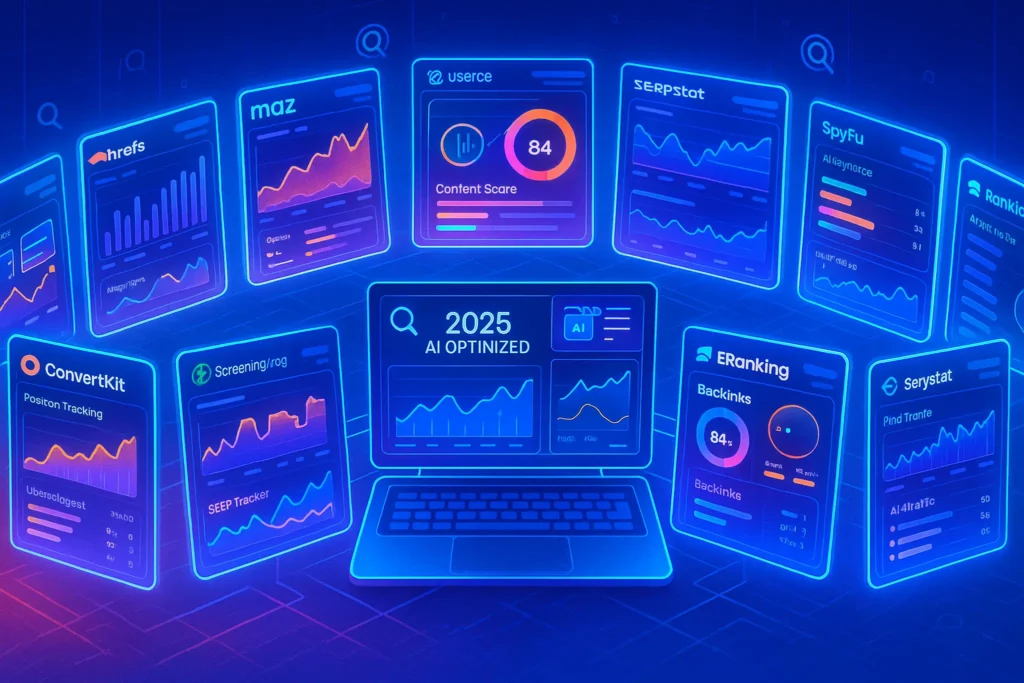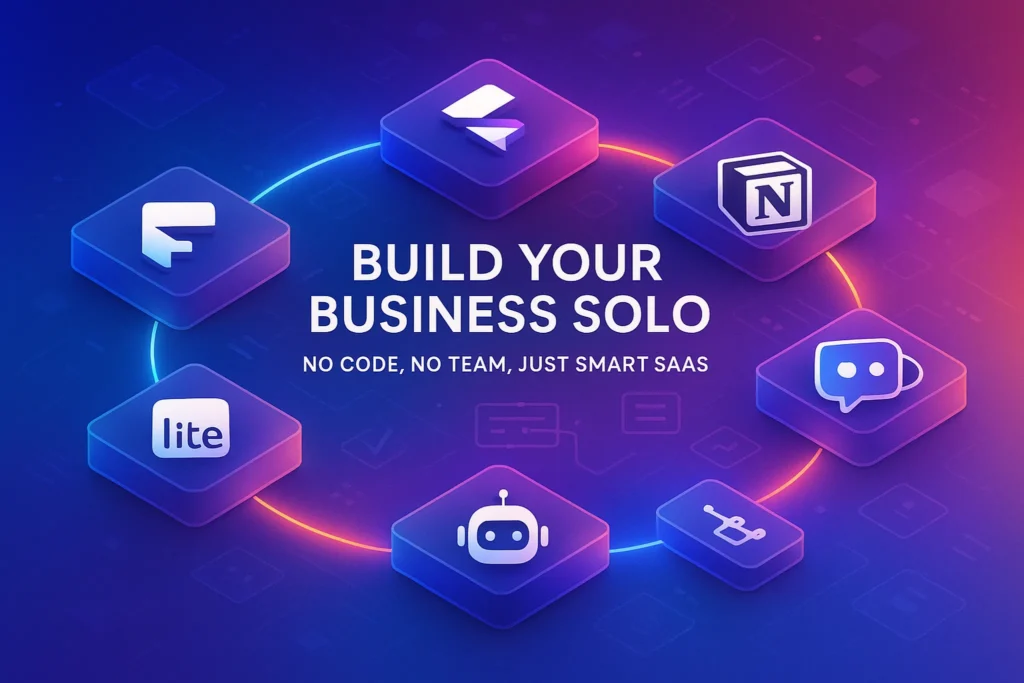-This post may contain affiliate links. If you click on one and make a purchase, I may earn a small commission at no extra cost to you.-
🔍 Intro: SEO Isn’t Dead — It Just Got Smarter
Every few years, someone claims “SEO is dead.” But here we are in 2025, and SEO is not only alive — it’s more powerful, dynamic, and data-driven than ever before.
From Google’s integration of MUM and EEAT signals, to the rise of AI-assisted optimization tools, the landscape has evolved fast. It’s no longer just about keywords — it’s about intent, content structure, page experience, and even author authority.
In this post, we’ll explore the 10 most relevant SEO tools in 2025 and break down how they’ve evolved to match the times. Whether you’re managing a niche blog or running a full-scale agency, there’s a smarter way to work with search—and these tools prove it.
🛠️ 1. Ahrefs – Still the Backlink King?
Ahrefs continues to dominate backlink analytics with the most comprehensive live link index available. What sets it apart in 2025 is its expansion into content decay detection and topical authority mapping. These new features allow SEOs to proactively maintain rankings by identifying outdated pages and declining link equity—before traffic drops occur. The Predictive Link Loss tool uses machine learning to forecast which backlinks are at risk of disappearing, helping users preserve their domain authority. Combined with its competing domain gap analysis, internal link visualizer, and accurate SERP history, Ahrefs has evolved from a backlink checker into a strategic SEO command center.
Ahrefs has long been the gold standard for backlink analysis, and in 2025, it’s doubling down on link intelligence and content auditing.
🔍 Key Features:
-
Site Explorer with updated backlink freshness filters
-
Keyword Explorer with SERP volatility insights
-
AI Content Health Checker for pruning low-quality pages
-
Predictive Link Loss Tool that flags potentially decaying links
Ahrefs remains the best choice for teams focused on off-page SEO, especially affiliate marketers and brands that rely on authority-building through content outreach.
And yes, it’s still a favorite among link-building experts — especially when used alongside smart topic research from tools like ChatGPT for Keyword Research.
🚀 2. SEMrush – The Swiss Army Knife for SEO & Beyond
SEMrush has fully embraced its role as a full-stack marketing suite, now covering SEO, PPC, social media, and content in one cohesive platform. In 2025, it introduced dynamic SERP heatmaps that show actual user click zones on search results, giving you an edge in CTR-focused optimization. It also leverages GPT-powered assistants to suggest schema types, internal link paths, and even voice search questions tailored to your industry. These insights go beyond traditional keyword tools, making SEMrush ideal for multidisciplinary teams who need to align their SEO with ad campaigns, content strategy, and analytics—all in one place.
If you want an all-in-one platform that spans SEO, PPC, social media, and competitor research, SEMrush is your go-to.
🔍 New in 2025:
-
SERP Heatmap Tracking: Visualizes CTR zones per keyword
-
AI Writing Recommendations powered by GPT-4
-
Improved Content Outline Builder with NLP analysis
SEMrush is ideal for teams juggling organic + paid search strategies, especially when coordinating between content, SEO, and social channels.
For businesses that need tight integration between their blog, ad campaigns, and email funnels, this tool pairs perfectly with platforms in our Best Email Marketing Tools list.
🧭 3. Moz Pro – Trust, Simplicity, and Content Focus
Moz Pro remains a favorite for white-hat SEOs and consultants who value clarity, data integrity, and simplicity. In 2025, it rolled out a revamped Spam Score engine, offering deeper insights into backlink risk factors and helping users identify potentially toxic link profiles early. The standout feature is now the Moz AI Assistant, which automatically summarizes page-level SEO opportunities—such as title improvements, content gaps, and link-building suggestions. For content teams managing dozens of pages, this means less time in spreadsheets and more time publishing. Combined with new Data Studio integration, Moz Pro has become a content-focused platform that’s both intuitive and strategically sound.
Moz continues to serve freelancers and consultants who prefer clean reporting, actionable scores, and a content-centric workflow.
🔍 What’s New in Moz Pro:
-
Moz AI Summaries: Content analysis + optimization tips
-
More accurate DA (Domain Authority) updates
-
Integration with Google Search Console + GA4
Its Spam Score, Page Optimization Checker, and on-page tools are still among the most beginner-friendly in the industry.
Ideal for SEOs who prioritize white-hat strategies and need fast, understandable client reporting.
✍️ 4. Surfer SEO – AI-Driven Content Scoring
Surfer SEO in 2025 has positioned itself as the essential optimization companion for AI writers. It’s no longer just about keyword density or outline suggestions—it now offers Content Velocity Scores that help you determine how often your articles need to be refreshed to stay competitive in SERPs. For content-heavy sites or affiliate blogs with large post libraries, this metric alone is game-changing. The platform also integrates directly with tools like Jasper and Notion, giving you a seamless workflow from content generation to optimization. If you’re managing content at scale, Surfer SEO ensures you’re not just publishing more—but publishing smarter.
Surfer SEO has become the leading tool for real-time content optimization, especially with AI writers.
🔍 Notable Features:
-
SERP-based content scoring
-
NLP-driven keyword recommendations
-
Audit tool that compares your content vs top 10 competitors
-
GPT plugin for real-time content rewrite & improvement
If you’re writing with AI, especially using tools from our Best AI Writing Tools for Bloggers, Surfer ensures your output isn’t just readable—it ranks.
💻 5. SEO PowerSuite – Privacy-Focused Desktop SEO
SEO PowerSuite is the tool of choice for SEOs who demand complete control and data ownership. As a desktop-based platform, it avoids many of the limitations of cloud tools—no data caps, no storage costs, and total privacy. In 2025, it introduced the new SEO SpyGlass module, which lets you track historical backlink profiles and penalty risks over time. This is especially helpful for cleaning up legacy SEO messes or auditing clients’ backlink histories. The technical site audit and keyword mapping tools remain robust, and PowerSuite’s licensing model makes it cost-effective for consultants managing multiple sites offline.
Unlike most cloud-based tools, SEO PowerSuite offers a one-time license and desktop-based SEO tracking — which appeals to privacy-conscious users and consultants working offline.
🔍 What Makes It Unique:
-
Full access to on-page SEO, rank tracking, and link auditing
-
White-label reporting for client agencies
-
GDPR-safe — no data shared with third-party servers
If you’re working in regulated industries or just want full control of your SEO data, this is your tool.
🐸 6. Screaming Frog – The Ultimate Technical Crawler
Screaming Frog continues to be the go-to technical crawler in the SEO industry. The 2025 update added full JavaScript rendering, better handling of dynamic content, and integration with Core Web Vitals via Lighthouse and PageSpeed APIs. More importantly, users can now schedule recurring crawls and receive automated email reports—ideal for ongoing site health checks. With plugins for Ahrefs and GA4, it’s not just a crawler anymore; it’s an integral part of any serious SEO’s diagnostic workflow, especially during site migrations or complex replatforming projects.
Every serious technical SEO uses Screaming Frog — and for good reason.
🔍 Technical Capabilities:
-
Crawls up to 500 URLs for free
-
Spot redirect chains, duplicate content, broken links, and orphan pages
-
New in 2025: JS rendering improvements, and Core Web Vitals integration
Perfect for agencies conducting full site audits, especially when launching redesigns or migrating platforms.
🪄 7. Ubersuggest – Beginner’s SEO Companion
Ubersuggest has matured significantly. While once considered a “lite” tool for beginners, its 2025 version now includes team collaboration features, GA4 integration, and even branded audit reports for client use. Its AI writing assistant evaluates content for readability, search intent match, and suggests paragraph rewrites using real-time SERP analysis. For budget-conscious marketers or side-hustlers, Ubersuggest now provides many of the core functions you’d expect from premium tools—without the learning curve or steep price tag.
Developed by Neil Patel, Ubersuggest is a freemium tool that introduces key SEO metrics in a simplified interface.
🔍 What You Get:
-
Keyword ideas and SERP analysis
-
Basic backlink and site audits
-
New in 2025: AI-generated content outlines
It’s ideal for bloggers and early-stage creators who want affordable insights without getting lost in dashboards.
📈 8. Rank Math Pro – WordPress SEO Power
For WordPress users, Rank Math Pro has become the most comprehensive native SEO solution. Its 2025 updates introduced visual schema builders, AI-powered meta tag generation, and Search Console analytics directly within the WP dashboard. You can now create structured data for reviews, FAQs, and recipes in a drag-and-drop format without writing code. It also manages redirections and canonical tags intelligently, reducing plugin clutter. For solo bloggers or small content teams, Rank Math Pro removes the need for external SEO tools by embedding everything directly where they work.
For WordPress users, Rank Math Pro offers an all-in-one SEO plugin with advanced options that rival many cloud tools.
🔍 Core Features:
-
Advanced schema markup
-
Rank tracker inside WP
-
Google Indexing API integration
-
AI content scoring (Beta 2025)
Combine Rank Math with a solid content stack and tools like Surfer or SEMrush, and you’ve got a full-stack SEO setup—without leaving WordPress.
📊 9. SE Ranking – Underrated All-in-One Suite
SE Ranking has evolved into a flexible powerhouse in the all-in-one SEO category. With a modular pricing system, it’s scalable for both freelancers and agencies. The 2025 update brought powerful new features like AI-assisted keyword grouping, competitor trend alerts, and social signal tracking. Its Local SEO module is especially noteworthy: it includes citation auditing, review aggregation, and NAP (Name-Address-Phone) consistency checks, helping local businesses thrive in map packs and localized queries. For consultants, the white-label dashboard and report automation are huge time-savers.
SE Ranking offers a surprisingly powerful mix of features for its price point—ideal for solo SEOs or small teams.
🔍 Standout Tools:
-
Rank Tracker
-
Backlink Checker
-
Content Marketing Module
-
White-label reporting
Its clean UI and customizable dashboards make it great for freelancers and small agencies who need simplicity with power.
🧠 10. NeuralText / Outranking – The AI-First Optimizers
These AI-first platforms are redefining how SEO and content creation come together. In 2025, they added entity-level scoring, meaning your content is now evaluated based on topical depth and semantic richness—not just keywords. Their AI Brief Builders generate outlines based on live SERP competitors, while the FAQ builder auto-generates schema-ready Q&A blocks for featured snippet targeting. With internal link suggestions and real-time NLP scoring, these tools are especially powerful for large teams producing structured, editorial content at scale. They help ensure not just that you rank—but that you rank consistently and with quality.
In 2025, AI content optimization is no longer optional—and tools like NeuralText and Outranking are pushing the boundaries.
🔍 Cutting-Edge Features:
-
Entity-based scoring
-
Outline generators based on SERP + NLP
-
AI-powered article rewriting + internal linking
They’re ideal for high-volume content teams that need to produce optimized pieces efficiently while maintaining Google-friendly structure.
📈 Algorithm Evolution: What Changed in 2024–2025?
SEO in 2025 is less about stuffing keywords and more about search experience. Here’s what changed:
-
Google MUM (Multitask Unified Model) is fully rolled out — search is more context-aware, visual, and multilingual
-
Exact match keywords have lost weight; intent + relevance are king
-
EEAT (Experience, Expertise, Authority, Trustworthiness) signals are now core
-
User experience metrics (scroll depth, bounce, load speed) directly affect rankings
-
Google detects AI-generated content and penalizes low-quality outputs—unless clearly structured and useful
🧮 Feature Comparison Table
| Tool | Pricing | AI Features | Technical SEO | Content Optimization | Rank Tracking | Best Use-Case |
|---|---|---|---|---|---|---|
| Ahrefs | $$$ | Predictive Link Loss, AI Health | Medium | Medium | Strong | Link building, authority sites |
| SEMrush | $$$ | GPT Insights, Heatmaps | Medium | Strong | Strong | Agencies, SEO + PPC teams |
| Moz Pro | $$ | Moz AI Summaries | Light | Moderate | Medium | Freelancers, content audits |
| Surfer SEO | $$ | GPT content scoring | Weak | Very Strong | None | Real-time content writers |
| SEO PowerSuite | $ (one-time) | No cloud AI, full privacy | Strong | Medium | Strong | Consultants, privacy-focused |
| Screaming Frog | Free–$$ | Core Web Vitals, JS Rendering | Very Strong | None | None | Technical audits |
| Ubersuggest | $ | AI Outlines | Light | Light | Basic | Beginners, bloggers |
| Rank Math Pro | $$ | WP AI scoring, schema | Medium | Medium | Medium | WordPress sites |
| SE Ranking | $$ | Limited NLP scoring | Medium | Moderate | Strong | Freelancers, SMBs |
| NeuralText/Outranking | $$ | Entity scoring, auto-linking | Weak | Very Strong | None | AI-powered content teams |
💼 Use-Case Layering
| Persona / Scenario | Recommended Tool(s) |
|---|---|
| Affiliate blog focused on backlink growth | Ahrefs + Surfer SEO |
| Content marketing agency | SEMrush + SE Ranking |
| Budget-conscious freelancer | Ubersuggest or SE Ranking |
| WordPress blogger | Rank Math Pro + Surfer SEO |
| Technical SEO consultant | Screaming Frog + SEO PowerSuite |
| AI-driven high-volume content production | NeuralText or Outranking |
🧠 Nerd Verdict
SEO in 2025 is no longer about finding the “perfect” keyword — it’s about understanding user intent, content structure, and performance signals. Tools have adapted: some through AI integration, others by doubling down on technical precision or privacy-first architecture.
For solo creators, SEO tools like Ubersuggest, Rank Math, or SE Ranking offer a lot without breaking the bank. But for teams, agencies, or serious brands, investing in tools like Ahrefs, SEMrush, or Surfer SEO makes a measurable difference.
Your SEO stack should reflect your strategy. Choose wisely — because picking the wrong tool in 2025 might cost more than just rankings.
❓ FAQ: Nerds Ask, We Answer
💬 Would You Bite?
If you could only use one SEO tool in 2025, which one would you choose — and why?
Drop your answer in the comments 👇 Your real-world insights matter more than feature lists.



